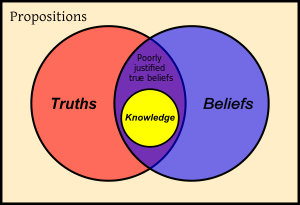 Image via WikipediaIf we define "knowledge" in terms of "epistemology", there have never been knowledge existed in China. "Knowledge" in ancient Chinese intellectuals minds only existed by its pragmatic terms: either for practical productiveness or political power. This tradition, created a "spectacular" phenomenon - that most Chinese intellectuals (Chinese people as well) take it for granted that knowledge serves power. And this understanding of knowledge, inevitably made Chinese intellectuals as a social class that is the most selfish, weak, and in many cases sycophantic group, which always leans to the powerful sides without the least conscience.
Image via WikipediaIf we define "knowledge" in terms of "epistemology", there have never been knowledge existed in China. "Knowledge" in ancient Chinese intellectuals minds only existed by its pragmatic terms: either for practical productiveness or political power. This tradition, created a "spectacular" phenomenon - that most Chinese intellectuals (Chinese people as well) take it for granted that knowledge serves power. And this understanding of knowledge, inevitably made Chinese intellectuals as a social class that is the most selfish, weak, and in many cases sycophantic group, which always leans to the powerful sides without the least conscience.Labels
Chinese culture
(16)
art
(18)
book reviews
(34)
child abuse
(10)
culture comparison
(10)
ethics
(11)
go game
(2)
history
(19)
life
(76)
love
(12)
movie reviews
(20)
my aphorisms
(97)
philosophy/reason
(13)
quotes
(42)
random thoughts
(146)
religion
(17)
suicide
(3)
November 4, 2011
Knowledge, Chinese Intellectual class and Political Power
 Image via WikipediaIf we define "knowledge" in terms of "epistemology", there have never been knowledge existed in China. "Knowledge" in ancient Chinese intellectuals minds only existed by its pragmatic terms: either for practical productiveness or political power. This tradition, created a "spectacular" phenomenon - that most Chinese intellectuals (Chinese people as well) take it for granted that knowledge serves power. And this understanding of knowledge, inevitably made Chinese intellectuals as a social class that is the most selfish, weak, and in many cases sycophantic group, which always leans to the powerful sides without the least conscience.
Image via WikipediaIf we define "knowledge" in terms of "epistemology", there have never been knowledge existed in China. "Knowledge" in ancient Chinese intellectuals minds only existed by its pragmatic terms: either for practical productiveness or political power. This tradition, created a "spectacular" phenomenon - that most Chinese intellectuals (Chinese people as well) take it for granted that knowledge serves power. And this understanding of knowledge, inevitably made Chinese intellectuals as a social class that is the most selfish, weak, and in many cases sycophantic group, which always leans to the powerful sides without the least conscience.
Labels:
Chinese intellectuals,
random thoughts
Subscribe to:
Post Comments (Atom)

I see what you are saying. In many countries, to get educated you need money, therefore those with money are more formally educated. It really does keep the classes separate and gives a sense of one group's superiority over another. Thank goodness many nations have free educational programs, though few include college.
ReplyDeleteJanene,
ReplyDeleteThanks for commenting. Not only that, in ancient china, to be educated itself meant to be bureaucrats. The content of education was also monotone - "moral" teachings, mostly Confucianism.
Hi YunYi, its an interesting topic...Although I am not much aware of the Chinese system, however, from experience of myself and others, I feel that doubt, curiousty, wonder, creativity are the guiding lights of knowledge.Even the limits of 'practicality' should be re-visited time to time and revised. Cheers :)
ReplyDeletethanks sb!
ReplyDeleteIt sounds like China is getting closer to England in their class warfare. And I thought Communism was to be an social equalizer.
ReplyDelete@zobop, Communism has never been a "social equalizer" in China, neither elsewhere, at least I believe so. "Social equalizing" was just an idea which sounded so good for majority oppressed people which helped a few politics to seize the power. As soon as this was done, social classes back to the hierarchy system, probably with different appearances, i.e. in China, intellectuals were drawn into bottom. Now, Chinese government started to give lots of benefits to intellectual class, which is good, but the dark side is, this policy that benefited Chinese intellectuals would only enhance government despotism, due to the nature of Chinese culture, which by my understanding is "knowledge serve the power".
ReplyDeleteYes, Yun Yi
ReplyDeleteThe notion of "equalizing" a society by any political system goes against our knowledge of all societies experience. After a revolution, the society reverts to a hierarchy to carry out the aims of the revolution or revert to a pre-revolutionary system.
So, apparently, "equalizing society" is
not a possibility. My best
Thanks CS! "Reverse", that's the word.
ReplyDelete